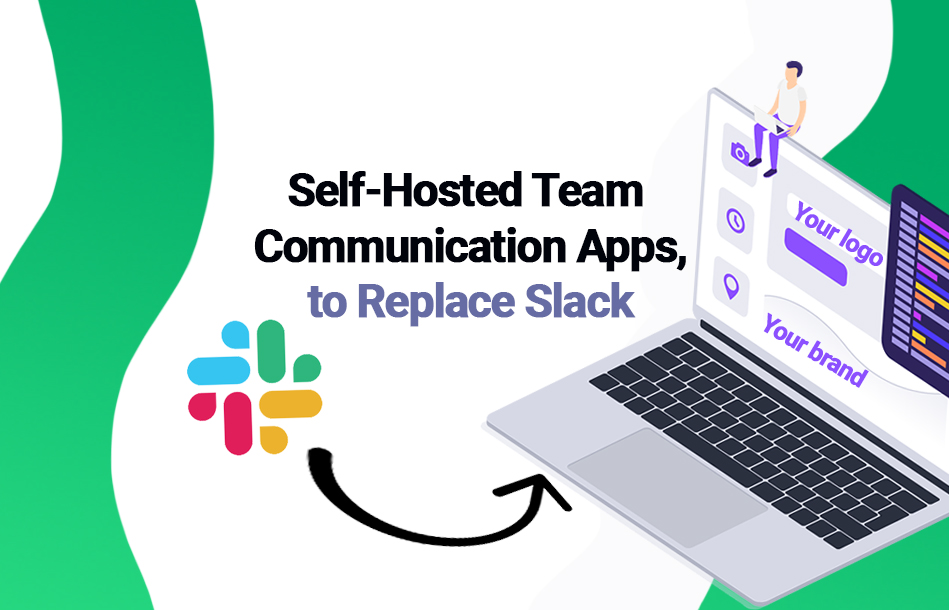Self-Hosted Team Communication Apps, to Replace Slack
Invite pending

As diversified workplaces and remote teams are emerging even more, the number of team communication tools is multiplying immensely.
The Problem
With so many tools on the market, which one should we choose? And is having too many tools becoming a problem?
Workplaces are Diversifying = More Tools Available = More Messy
The Rising Trend= Solution
With so many business communication tools available, a new trend has recently been emerging: businesses creating their very own branded messenger for their team communication, hosted on their servers/clouds. And the reasoning for this trend is gradually making sense to more and more businesses.
What is Self-Hosting?
Self Hosting is running your application by setting it on your servers or cloud. And some companies provide their ready-apps for team communication, that you can host and use yourself.
But what's the problem with Slack?
When using Slack, businesses have no other option but to dedicate their most confidential data and conversations to Slack. But by self hosting your own app, all your conversations will safely belong to you and only you.
Why are Businesses Opting to Self-Host?
Reason #1:
To Eliminate All Possible Data Risks
One of the biggest concerns and expenses companies face today is keeping their data and communications safe from data breach/loss and outside hacking attacks. A benchmark study performed by CSO found that the average ransomware attack costs a company $5 million.
What companies are more vulnerable to this kind of attacks? These third party server breaches, sadly, can happen to any-sized company which is using an adopted internal communication system (not on their servers). Just recently hackers published private messages from at least 81,000 Facebook users' accounts, the Marriott International data breach affected up to 500 million customers— larger than the entire U.S. population or when the customers of BestBuy, Kmart, Sears & Delta lost their data due to a chat & customer service platform.
But aren’t global market leaders systems safe? Today, people and businesses, having no other alternative, are delegating their data and privacy to global market leaders and corporate communication platforms, but that has oftentimes has backfired. Let’s just remember the …… Even though nearly all platforms these days promise safety and assurance, their security pledges always end where government or police interference starts. And sometimes it just takes a great green offer for them to open their backdoors.
What steps can be taken to avoid such issues?
- Consider hosting data on your servers. In this case, the risk isn’t totally gone, your servers can get hacked too, but at least you have full control of your security. The risk of damage from third party’s vulnerability or human mistake is eliminated.
- If going serverless isn’t for you, you can still rely on third-party servers, but we recommend developing a third-party vendor strategy.
Reason #2:
For Simplicity
One of the big reasons we see business strategy or digital marketing change so much is because of the adoption of more advanced technologies, better tools, and newer apps. But also because the web is getting saturated. When there are too many options, too much noise, what follows is usually a switch to a maximally simple option.
How many apps is too many?
For full team communication, organizations having no other alternative, mostly use 3-4 different apps. Something like:
- A Slack-like platform for internal team communication
- A SIP Phone for external communication
- A Conferencing platform
- An additional for out-of-office communication
Although many of these platforms are great, communication shouldn’t be so hard. That’s why there is high demand in the market right now, for a solution which will combine all must-have business communication tools. And most of the tools (listed below) give you a full-on app and let you customize making the app your own, with needed features.
How many apps is too many?
When white labeling your communication app you can also choose which features you would or would not like to have.
Reason #3:
For Branding
While other platforms might offer their versions of team communication apps, an app customized to your solution, and matching to your brand identity, colors and with your name and logo, is much more professional-looking and convenient for a business. And many companies (listed below) in addition to letting you self host, also offer to make the app look like yours.
Solutions for Self-Hosted Team Apps
Having a great team communication and management system is important for team collaboration and tracking your projects. It can provide a central place for documents, calendars and tools for budgeting and measuring workloads. Here are a few communication apps/systems that offer companies apps they can self host:
- Zangi
With Zangi you get your independent white label applications made for you, with your company logo and branding. The app is hosted on your side or cloud, separate from Zangi and other third parties.
Depending on your company preferences, your apps can be incognito or published on Google Play and the App Store. You can also add special security algorithms and keys into the source code. And you get a web dashboard for full management of your business and team. - TroopMessenger
With Troop Messenger you can privately host the application in your own servers to ensure no third-party access to your data. You get full control over the app and get your own custom domain name.
You can integrate unlimited plug-ins and applications. And you get powerful tools will help you with budgeting, estimating time and measuring workloads. - Mattermost
Mattermost brings all your team communication into one place, which is also searchable and accessible. You can use Mattermost with tons of integrations and applications: Jira, IRC, XMPP, Hubot, Giphy, Jenkins, GitLab, Trac, Redmine, SVN, RSS/Atom and others.